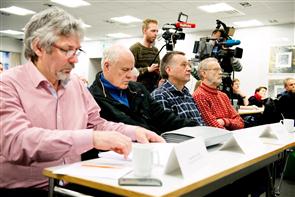Demands a dignified settlement for the pioneer divers
23.12.2013 15:22:14
The European Court of Human Rights in Strasbourg has decided that the Norwegian state failed to take responsibility for the North Sea divers who carried out hazardous diving in the 1960s, 70s and 80s. Leif Sande, president of Industri Energi, demands that the state now give the divers a dignified and proper settlement.
For mer informasjon

The North Sea divers have been successful in arguing that the Norwegian state has violated Article 8 of the European Convention on Human Rights by not providing the divers with important information to enable them to assess the risk posed to health and life by the diving.
“Between 1965 and 1990, the state did nothing to provide the divers with the information they needed to assess for themselves whether the dives were safe or not,” states Katrine Hellum-Lilleengen, attorney forThe Norwegian Confederation of Trade Unions (LO).
For more than a decade, the North Sea divers have been fighting to have the state admit its share of responsibility for the hazardous diving.
The European Court of Human Rights in Strasbourg (ECHR) has decided that the state has failed the North Sea divers by not informing them about the risks of rapid descent and ascent, and that it allowed the companies to utilise hazardous diving procedures without intervention.
“The North Sea divers have paid the price of insufficient information with their poor health, ruined professional careers and substantially lower quality of life. Now it is up to Norwegian politicians and the state to ensure that those who sacrificed their life and health on the altar of Norway’s development as a welfare state, receive a dignified redress and the recognition they deserve,” says Leif Sande.
He refers to the fact that the judgment from Strasbourg puts intense pressure on the State to return with a proper settlement and recognition of the pioneer divers.
The State will not appeal
“Thursday’s judgment will not be appealed,” says Minister of Labour and Social Affairs Robert Eriksson (Progress Party) to NTB.
“The State has a moral responsibility to the pioneer divers in the North Sea,” he says. This means that about 220 former North Sea divers will be paid damages of about NOK 67 000, as decided by the ECHR in its verdict on Thursday.
Serving their country
Leif Sande rejects the notion that the amount awarded by the ECHR is a final settlement; it is more of a symbolic sum for pain and suffering.
“The NOK 67 000 is petty change compared to what these divers have lost through ruined professional careers. They should at least be compensated for their financial loss as a result of ruined professional careers and chronic ailments which they contracted while serving their country,” says Leif Sande.
“The Government will now sit down to discuss the further process,” says Eriksson.
The Norwegian Petroleum Directorate failed
So-called decompression tables are intended to ensure that the divers do not descend or ascend too quickly .
.
“The Norwegian Petroleum Directorate (NPD) was obligated to publish these tables, but this was never done - they remained trade secrets because, among other things, the NPD did not understand the tables themselves,” says Eyvind Mossige, attorney for Industri Energy.
This prevented the divers from being able to assess the risk of the dives themselves. And the companies also started competing on delivering the quickest possible dives.
LO attorney Katrine Hellum-Lilleengen describes the conditions as a ‘bonanza", and elaborates on the scope of damage:
“Long-term damage such as brain damage, lung damage and post-traumatic stress syndrome were the results,” she says, and explains that as many as one in five were afflicted with various forms of divers' disease.
Historic judgment
ECHR has now clearly established that the State was obligated to implement mitigation measures.
This is the first time article 8 has been used in a labour context.
“This is an historic judgment. I’m impressed with all the divers and the determination you have shown. This is a big day for them,” says Eyvind Mossige, legal supervisor for IE.
“The ball is primarily in the State’s court. We have to see what they propose. One possibility is to rehear the Supreme Court case. The State is responsible for taking the initiative for further negotiations,” says Katrine Hellum-Lilleengen, attorney for LO.

“Between 1965 and 1990, the state did nothing to provide the divers with the information they needed to assess for themselves whether the dives were safe or not,” states Katrine Hellum-Lilleengen, attorney forThe Norwegian Confederation of Trade Unions (LO).
For more than a decade, the North Sea divers have been fighting to have the state admit its share of responsibility for the hazardous diving.
The European Court of Human Rights in Strasbourg (ECHR) has decided that the state has failed the North Sea divers by not informing them about the risks of rapid descent and ascent, and that it allowed the companies to utilise hazardous diving procedures without intervention.
“The North Sea divers have paid the price of insufficient information with their poor health, ruined professional careers and substantially lower quality of life. Now it is up to Norwegian politicians and the state to ensure that those who sacrificed their life and health on the altar of Norway’s development as a welfare state, receive a dignified redress and the recognition they deserve,” says Leif Sande.
He refers to the fact that the judgment from Strasbourg puts intense pressure on the State to return with a proper settlement and recognition of the pioneer divers.
The State will not appeal
“Thursday’s judgment will not be appealed,” says Minister of Labour and Social Affairs Robert Eriksson (Progress Party) to NTB.
“The State has a moral responsibility to the pioneer divers in the North Sea,” he says. This means that about 220 former North Sea divers will be paid damages of about NOK 67 000, as decided by the ECHR in its verdict on Thursday.
Serving their country
Leif Sande rejects the notion that the amount awarded by the ECHR is a final settlement; it is more of a symbolic sum for pain and suffering.
“The NOK 67 000 is petty change compared to what these divers have lost through ruined professional careers. They should at least be compensated for their financial loss as a result of ruined professional careers and chronic ailments which they contracted while serving their country,” says Leif Sande.
“The Government will now sit down to discuss the further process,” says Eriksson.
The Norwegian Petroleum Directorate failed
So-called decompression tables are intended to ensure that the divers do not descend or ascend too quickly
 .
.“The Norwegian Petroleum Directorate (NPD) was obligated to publish these tables, but this was never done - they remained trade secrets because, among other things, the NPD did not understand the tables themselves,” says Eyvind Mossige, attorney for Industri Energy.
This prevented the divers from being able to assess the risk of the dives themselves. And the companies also started competing on delivering the quickest possible dives.
LO attorney Katrine Hellum-Lilleengen describes the conditions as a ‘bonanza", and elaborates on the scope of damage:
“Long-term damage such as brain damage, lung damage and post-traumatic stress syndrome were the results,” she says, and explains that as many as one in five were afflicted with various forms of divers' disease.
Historic judgment
ECHR has now clearly established that the State was obligated to implement mitigation measures.
This is the first time article 8 has been used in a labour context.
“This is an historic judgment. I’m impressed with all the divers and the determination you have shown. This is a big day for them,” says Eyvind Mossige, legal supervisor for IE.
“The ball is primarily in the State’s court. We have to see what they propose. One possibility is to rehear the Supreme Court case. The State is responsible for taking the initiative for further negotiations,” says Katrine Hellum-Lilleengen, attorney for LO.